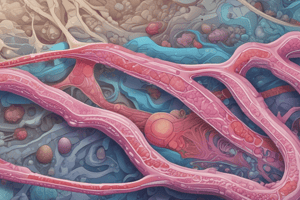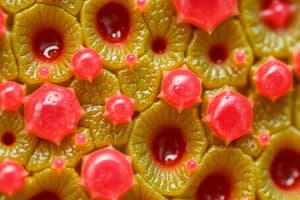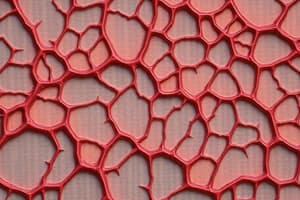Podcast
Questions and Answers
Where are plant epithelial tissues primarily found?
Where are plant epithelial tissues primarily found?
- Leaves, roots, and stems (correct)
- Vascular bundles
- Plant cell walls
- Flowers and fruits
Which type of animal epithelial tissue is characterized by a single layer of flat cells?
Which type of animal epithelial tissue is characterized by a single layer of flat cells?
- Columnar epithelium
- Cuboidal epithelium
- Glandular epithelial cells
- Squamous epithelium (correct)
What is the main function of animal epithelial tissues?
What is the main function of animal epithelial tissues?
- Respiration
- Photosynthesis
- Food storage
- Protection, secretion, absorption, and filtration (correct)
How do plant epidermal cells contribute to protecting the plant?
How do plant epidermal cells contribute to protecting the plant?
Which type of animal epithelial tissue is characterized by tall, column-shaped cells?
Which type of animal epithelial tissue is characterized by tall, column-shaped cells?
What are the key functions of plant epithelial tissues?
What are the key functions of plant epithelial tissues?
Which type of epithelial tissue is found in the skin and mucous membranes?
Which type of epithelial tissue is found in the skin and mucous membranes?
How are simple and stratified epithelial tissues classified based on their cell layers?
How are simple and stratified epithelial tissues classified based on their cell layers?
Which epithelial tissue type is important in maintaining water balance and protecting against mechanical injury and parasites?
Which epithelial tissue type is important in maintaining water balance and protecting against mechanical injury and parasites?
In which part of the body would you find stratified cuboidal epithelium?
In which part of the body would you find stratified cuboidal epithelium?
Flashcards are hidden until you start studying
Study Notes
Epithelial Tissues in Biology Chapter 6 (Class 9th)
Epithelial tissues are sheet-like structures that serve as the body's outer protective barriers and perform vital functions such as protection, absorption, secretion, and filtration. In this chapter, we will explore the properties and roles of epithelial tissues in plants and animals.
Epithelial Tissues in Plants
Plant epithelial tissues, also known as epidermal tissues, are primarily found in the leaves, roots, and stems. These tissues are composed of a single layer of cells, which serve to protect the plant against mechanical injury, water loss, and invasion by parasitic fungi. In plants, the epidermal cells lack intercellular spaces, which helps maintain the integrity of the protective barrier.
Epithelial Tissues in Animals
Animal epithelial tissues are made up of layers of cells that are in direct contact with the environment. These tissues provide protection, secretion, absorption, and filtration functions. Examples include:
- Squamous epithelium: A single layer of flat cells found in the lining of the mouth, oesophagus, and other body surfaces.
- Cuboidal epithelium: A single layer of cube-shaped cells, which are found in the kidney tubules and salivary glands.
- Columnar epithelium: A single layer of tall, column-shaped cells, which are found in the intestinal tract and respiratory tract.
- Glandular epithelial cells: Cells that secrete substances, such as the mammary glands and sweat glands.
Diversity of Epithelial Tissues
Epithelial tissues are further classified into simple epithelium and stratified epithelium.
- Simple epithelium: A single layer of cells, which are thin and easily distinguished from each other. Examples include squamous epithelium and simple cuboidal epithelium.
- Stratified epithelium: A layer of cells that is composed of multiple cell layers arranged in a particular pattern. Examples include stratified squamous epithelium (keratinized), which is found in the skin and mucous membranes, and stratified cuboidal epithelium, which is found in the esophagus and urinary bladder.
Key Points
- Epithelial tissues are sheet-like protective barriers in plants and animals.
- Plant epithelial tissues offer protection, absorption, and secretion functions.
- Animal epithelial tissues provide protection, secretion, absorption, and filtration functions.
- Epithelial tissues can be classified as simple and stratified.
- Epithelial tissues help maintain the water balance and protect against mechanical injury and invasion by parasites.
Studying That Suits You
Use AI to generate personalized quizzes and flashcards to suit your learning preferences.



